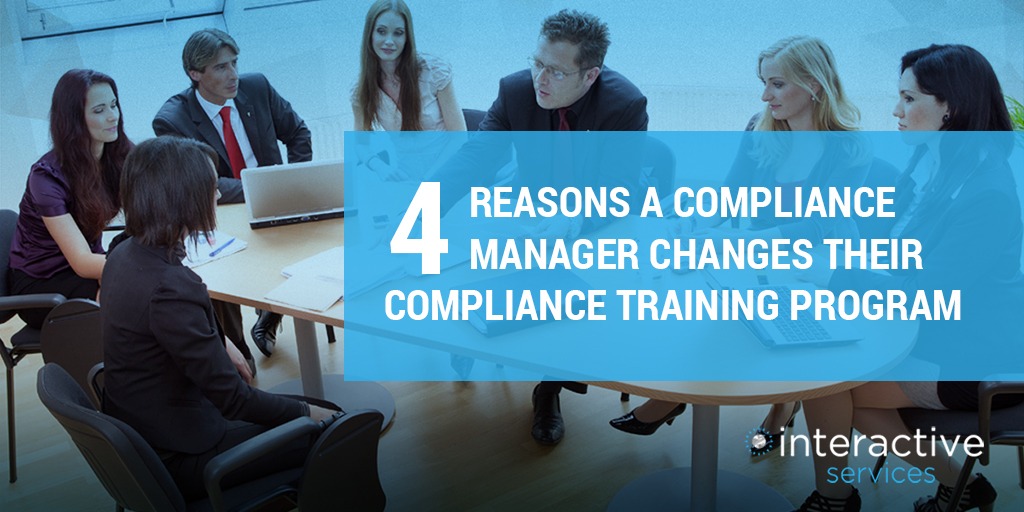
As technology evolves, modern workplaces are changing too. The ability for employees to adapt and learn new skills is increasingly critical, particularly for companies operating under challenging regulatory constraints. Firms rely on compliance training providers to ensure that their employees understand the specific rules and requirements around compliance. It’s a good investment! The costs of noncompliance can be staggering.
Savvy compliance officers are always looking for ways to optimize their enterprise training programs. Here are four reasons why they might choose one e-learning provider over another.
1. Lack of innovation
Society is experiencing a cultural and technological shift, and disruption has become the buzzword of the decade. Companies are looking for the next big shake-up in compliance training, and they are seeking out e-learning providers that bring both innovation and expertise to the table.
This in part is driven by their youngest employees. The internet has brought advanced communications technology to millions of American homes. Young people today have grown up with smartphones, with the ability to connect to almost every other person in the world. Unsurprisingly, this has caused them to see disruptive innovation as normal.
Digital learning programs, available on all devices, meet employees where and when they need training and support. Bite-sized nuggets of content match the hectic schedule of the modern workplace, and a focus on real people and real situations brings relevance and relatability to content.
Ask your training provider: How do you know your content is innovative?
2.Ineffective e-learning options
In 2017, a thinktank dedicated to uncovering strengths and weaknesses in corporations and other organizations turned its attention towards compliance training programs. The Brandon Hall Group’s Training Benchmarking Study found that the vast majority of companies with compliance training programs found their efforts to be less effective than they had hoped. In fact, only 35 per cent of companies that participated in the study identified their compliance training as “effective.” The rest of the respondents indicated that their efforts were “somewhat effective,” and a small proportion – about four per cent – reported that their overall compliance training efforts were not effective.
Offering e-learning is one way that compliance training providers can improve programmatic effectiveness. When executed effectively, e-learning can be an efficient and effective way to improve performance and decrease costs. As a result, compliance managers often select companies that provide robust e-learning options over those that do not.
Violating regulatory requirements can have disastrous consequences. Fines assessed on Wall Street banks following the 2008 financial crisis tallied over $110 billion, and even unintentional violations of administrative rules can force a company to shut its doors. Companies simply cannot afford ineffective e-learning options, and providers that are not able to accommodate the real-world needs of today’s regulated industry will not be able to compete. Compliance managers are demanding the most cutting-edge e-learning solutions from enterprise learning companies in order to avoid the very real threats created by poor compliance training.
Ask your training provider: How do you know your content is effective?
3.Falling behind the cutting edge
Compliance in the digital age is growing more complicated by the minute. Managing big data in today’s transparency-driven regulatory environment is a considerable technological challenge, and ever-expanding monitoring and disclosure requirements are raising privacy concerns among personnel and clients of regulated firms. Regulated companies that fall behind the cutting edge in compliance assurance suffer the consequences of failing to meet the technological challenges of the modern age, and e-learning companies offering compliance training programs suffer the same fate when they become unable to keep up-to-date.
Compliance officers are seeking out e-learning companies at the cutting edge of educational technology in order to provide the best possible compliance training services. Compliance officers that do not seek out e-learning providers that integrate new technologies into their digital learning platforms are sure to fall behind their competitors.
Ask your training provider: What analytics and data can you provide to enhance your content offering?
4 Lack of customization
Standardization has its benefits, particularly in compliance. Standardized processes are efficient, and they can help ensure that rules are followed companywide. However, in order to be both effective and efficient, compliance training programs must be customized to meet every client’s needs.
Providers that offer customizable e-learning solutions are able to craft more effective compliance training programs than providers that only offer standardized options. Further, when companies are able to provide input on their needs, goals, and objectives, training materials can be developed in a manner that aligns with organizational standards.
When clients collaborate with e-learning providers, they are more likely to be satisfied with the outcome. As a result, regulated firms are always on the lookout for compliance training programs that utilize e-learning technologies customized to suit their individual needs.
Ask your training provider: How do you make it easy for me to customize your content?
Have you concerns about your compliance training? is it Innovative and effective? Talk to us about the many ways Interactive Services can help you with your Compliance Training.
